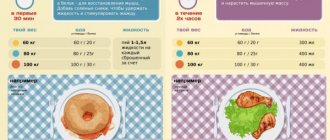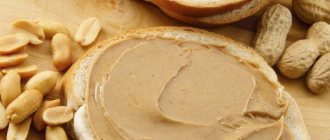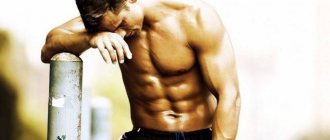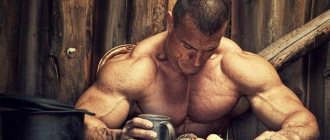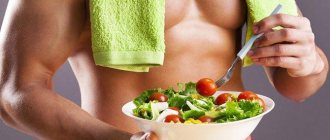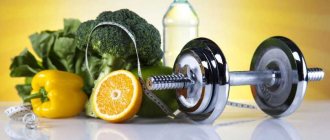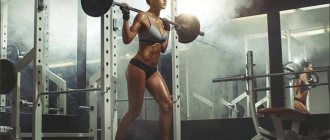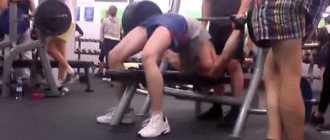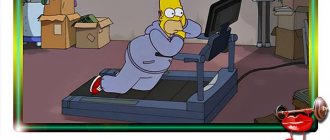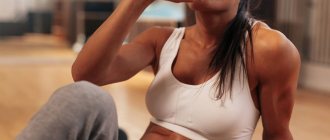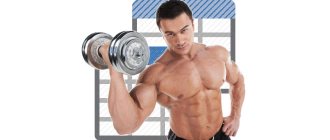An important question for every athlete is what you can eat after training. Sports activities are different. Exercises for muscle growth, mass gain, weight loss, strength sports, and gym sessions can transform an athlete in different ways. Different goals require different means. And nutrition, with different efforts, based on the same principles, is adjusted to specific tasks. The standard nutrition for intensive and regular training in the gym is fractional. Here we'll look at what's best to eat as a post-workout snack, without touching the main meals of breakfast, lunch and dinner.
In the morning
Breakfast, lunch and dinner constitute three meals a day - this is not enough to cover the body's daily energy expenditure during regular exercise. The rational nutrition regimen provides two more snacks for the correct nutritional load during the day - in the morning and in the evening.
After breakfast and morning exercises, it is important for an athlete to eat. The concept itself implies a small amount of food necessary to maintain energy growth and its expenditure during exercise.
In the first 20 minutes after charging, when the body continues to burn calories, food is completely processed and nothing is stored as fat. This is the optimal time to consume proteins and carbohydrates, but not fat. Food is used to restore energy and for muscle growth.
Carbohydrates are better absorbed in liquid form. It can be grape or apple natural juice. You can eat fruits, vegetables, cereals. The norm is 1 g of carbohydrates per 1 kg of weight. You cannot drink sweet soda, eat sweets, or sweet curd cheeses. To provide your body with proteins, drink a whey shake. You can dilute protein powder in juice before exercise and drink it after your workout. Normal protein weight is 0.6 g per 1 kg of weight. Instead of a cocktail, you can drink milk or, best of all, eat egg whites.
Drinking a glass of milk and snacking on a banana is a classic morning snack after a gym workout.
Eating after exercise is necessary for only one purpose - the fastest possible muscle recovery. Fat in foods slows down the absorption of proteins and carbohydrates, so it should not be there.
TOP 10 fruits for athletes
The top ten healthiest fruits for athletes include the following:
- Grape
. The high glycemic index of grapes ensures rapid replenishment of expended energy. The high content of B vitamins, as well as vitamins A and C, has a positive effect on the general condition of the body after intense training.
It is grape juice that is recommended to dilute creatine - a highly effective sports nutrition for gaining muscle mass.
- Apple
. The high iron content makes this fruit indispensable for athletes. Fiber helps normalize intestinal function, and vitamin C is an excellent antioxidant. - Cherry
. Helps in the fight against inflammatory processes, which are common among athletes who prefer high-intensity training. 50-100 grams of cherries added to a protein shake will help replenish expended energy and quickly recover after exhausting sports activities. - Pomegranate
. This exotic fruit is rich in antioxidants that accelerate cellular regeneration. Among other things, pomegranate has a positive effect on male potency and replenishes vitamin C and iron deficiency. - Grapefruit
. This bitter-tasting citrus is a real storehouse of vitamins. It helps restore the digestion process and speeds up metabolism. Due to its high vitamin C content, grapefruit can strengthen the immune system and help fight inflammation. - Orange
. Just like grapefruit, orange is considered one of the leaders in vitamin C content. One orange after training and you are guaranteed an excellent metabolism. - Banana
. A fruit with a high glycemic index, which is probably why it is not recommended for people trying to lose weight. For athletes trying to gain weight, a banana is an excellent snack after strenuous exercise. - Kiwi
. The high content of vitamin K, folic acid and potassium has a beneficial effect on the nervous system, which promotes rapid recovery after strength and aerobic exercise. - Avocado
. Not everyone will like this exotic fruit. At the same time, its benefits for the body are invaluable: it helps reduce cholesterol levels, normalizes blood pressure, and controls the formation of cancer cells. For bodybuilders undergoing the “drying” procedure, this fruit is indispensable. - Strawberry
. The berry, beloved by many, is useful not only for decorating baked goods - its high content of nutrients will provide a surge of energy. It is recommended to eat strawberries before training to get maximum energy for effective bodybuilding and fitness.
Do not forget that all citrus fruits are allergenic, so if you are prone to allergies, it is better not to overdo it and instead of a whole orange or grapefruit after training, drink freshly squeezed juice, half diluted with clean drinking water.
Please help make this article better. Answer just 3 questions.
The main advantage of fruits before and after a workout is their relatively low calorie content, so you don’t have to worry about the portion you eat being deposited on your sides or thighs.
In the evening
How to eat if training in the evening? Here we are not talking about dinner, but about a snack 20 minutes after the end of class. And about a snack at night before bed. Such meals are necessary not to maintain vitality in the body, but to prevent the destruction of muscle tissue, lethargy and weakness in the mornings after working out in the gym.
Bodybuilder nutrition can be natural, mixed and sports. It’s easier to use sports nutrition and drink suitable cocktails for snacks. However, the principles of rational nutrition do not encourage the replacement of natural products with active additives. Therefore, it is better to use a mixed type of nutrition.
- If you are exercising to increase body weight, then eat foods containing proteins and carbohydrates.
- If classes are conducted for muscle growth and to remove fat, then you can only snack on proteins. Whey protein will do. From products, choose those in which protein is absorbed faster - eggs instead of cottage cheese.
Eating protein before bed is good. Eating this way at night will help the body build muscles. Cottage cheese, egg whites, kefir - all this can be eaten both when losing weight and for gaining weight. Carbohydrates and fat should not be part of foods eaten before bed. An ideal product for a snack before bed is low-fat cottage cheese.
It is not recommended to go to bed immediately after a snack. You can just sit or do something easy: read, watch TV. And after half an hour you can already go to bed. Then your sleep will be light and restful.
Don't forget to have snacks on non-workout days. After all, fractional meals are necessary not only for gaining or losing body weight, but also for the absence of hunger, complete digestion and assimilation of all consumed foods.
Don't be afraid to have a light snack after finishing your exercise. Fat does not burn for a long time, and if you do not feed a hungry body, the muscles will begin to weaken.
The laws of rational nutrition have not been repealed. And violating them will only stop you in development and slow down the achievement of your goal.
- We advise you to read about: diet after six in the evening
Restoration of the nervous system
It would seem that what else is needed, besides the regeneration of muscle fibers, to continue training? There is another factor that needs restoration - the central nervous system.
As you know, before performing work, the brain sends a signal to the muscles so that they perform this or that action.
The more complex this action is, the more intense and precise the impulse needs to be given to the brain and muscles. Accordingly, when it comes to lifting a barbell, the brain sends a strong signal. The more intense it is, the more tired the nervous system is. That is, after a hard workout, the nervous system also needs recovery.
Factors influencing the regeneration of this system coincide with muscle recovery. During sleep, the central nervous system completely calms down and regenerates. Proper and healthy nutrition provides the body with all the necessary substances, which also affect the human nervous system.
Indicators of fatigue of this system are weakness, headache, lack of appetite, and so on. If these signs are present, then physical activity should be avoided for a week or two for complete recovery.
To lose weight
What should a girl eat after training to lose weight? The main rule is to eat little and often. By refusing to eat in the evening, you can quickly lose weight. But the intensity of your exercise will decrease, your metabolism will slow down, and hunger will prevent you from losing weight. Therefore, a snack after exercise in the gym is necessary - it is advisable to eat within half an hour.
- After your morning workout, snack on a salad of lean meat and cottage cheese or cottage cheese.
- After your evening classes, eat a piece of cheese or drink a glass of milk. It's even easier to drink a protein shake.
Carbohydrates are excluded from snacks. The fat released during training is released back into muscle tissue when carbohydrates are consumed.
The calorie content of food should be 2 times less than the energy spent in the gym during classes. Then the rule - not to eat for 2 hours after working out in the gym in order to lose weight - does not need to be followed. It's very difficult to stick to and doesn't have much benefit. The ratio of carbohydrates to protein in a post-workout snack is 3:2.
How many rest days between workouts?
This thing is purely individual. However, all studies agree on one thing: it takes 48 to 72 hours for muscles to fully recover.
The legs are the largest muscles in the body, you're dealing with powerful quadriceps, hamstrings, and glutes. Research shows that the larger the muscle group, the longer it takes to recover. This is absolutely logical. For example, almost every exercise uses your arms, but it is rare to overtrain them. The bottom line is that muscle mass in the arms is much less than in any other area of the body. Therefore, they need less time to recover. What happens if you rest longer? Here is an example of a popular 5-day training program:
- Monday - chest.
- Tuesday - back.
- Wednesday - hands.
- Thursday - legs.
- Friday - shoulders.
- Saturday, Sunday - rest.
Only 2 days off a week, but all major muscle groups are trained only 1 time. This means there will be 6 days of rest between leg workouts. If your strength training is really heavy, then you can achieve great results with this program. The best way to determine your maximum rest period is to rest a muscle group longer than usual. For example, 7 days. And then check whether the strength has increased. If the strength has increased, then give it a rest for 8-9 days. Sometimes this period can be 12-14 days before the strength begins to decrease. People who exercise regularly can maintain their strength levels for a long time.
Experienced athletes can maintain their strength levels for a long time by training just once a week.
After strength training
What should you eat after strength training? Strength training combines exercise in the gym, weight training, CrossFit exercises and other activities necessary for gaining mass and growing muscles. Strength sports involve heavy loads and energy consumption. Snacks can feel like a full meal. Regulate the amount of food you eat so that excess does not turn into fat.
In the morning, after class, make a snack of protein foods with carbohydrate porridges:
- Veal with buckwheat porridge;
- Rabbit meat with rice;
- Turkey with oatmeal.
In the evening, proteins should predominate in the menu to strengthen muscles:
- Chicken with zucchini;
- Meat with cucumbers and tomatoes;
- Squid with carrots.
During the first 10-20 minutes after completing the exercises, when having a snack, in addition to protein foods, fast carbohydrates are added: fruits, honey.
If you are gaining weight, eat 2 times more carbohydrates than protein. If you are losing weight, snack only on protein foods. If your weight is normal, there is as much protein in your diet as carbohydrates.
If the goal is not to grow muscles, then snacks have a small portion size. Nuts, milk, cheese and protein shakes are used.
Rest between workouts - how many days do you need to recover?
How much rest do you need between workouts? This is perhaps one of the most important issues in strength sports and bodybuilding. The reason is obvious - it has to do with rest and recovery. And 80% of the result depends on them. Most people are convinced that the most important thing is to regularly visit the gym. But it is not always the case. You could even say that rest is more important than the workout itself. If you've been training hard for the past few months without any noticeable results, then your problem is most likely recovery. There may be several reasons why you cannot achieve the desired result:
- The weights are too small.
- Performing ineffective exercises.
Most likely there are others. But, if the muscles receive enough stimulus to grow and do not grow, then the problem lies precisely in rest. This most often happens to those who are trying to gain muscle mass and burn fat at the same time. It is much more difficult for them to recover due to a lack of calories. Another situation is that some people strictly adhere to proper nutrition, avoid “harmful” foods, and often limit themselves too much. So why are there no results? Are you exercising too much? How many days should you rest between workouts from a sports science perspective?
What not to eat
What you should never eat after training:
- You cannot eat anything that is not allowed during any sports activities: sweets, alcohol, fatty, fried, spicy and smoked foods.
- Instant soups, sausages, GMO products, factory-made semi-finished products.
- Products containing fat, which prevents carbohydrates and proteins from being fully absorbed.
- Consume caffeine, which is found in coffee, tea, chocolate, and cocoa. It interferes with muscle recovery and carbohydrate absorption.
- Before going to bed, it is not advisable to eat eggs, mushrooms, high-calorie and fatty foods.
Anatomy of muscle fibers
There are two theories of muscle growth: destruction and accumulation. To understand what kind of break there should be between workouts, consider the first hypothesis.
It says that during training, muscle fibers are destroyed as a result of work, that is, lifting weights. Accordingly, the more intense and longer the session, the greater the muscle destruction. But is this good?
Muscle breakdown is a signal to the body that recovery is required. Immediately after training, muscle fibers begin to regenerate. The most important thing here is that the body restores tissue with a small reserve, that is, the muscle becomes stronger each time. This way, you can either perform more reps or lift more weight in your next workout. This phenomenon is called supercompensation.
It is very important for an athlete to determine the right time for a break between workouts in order to see progress in sports activities.
On topic: Mini trampoline for training

